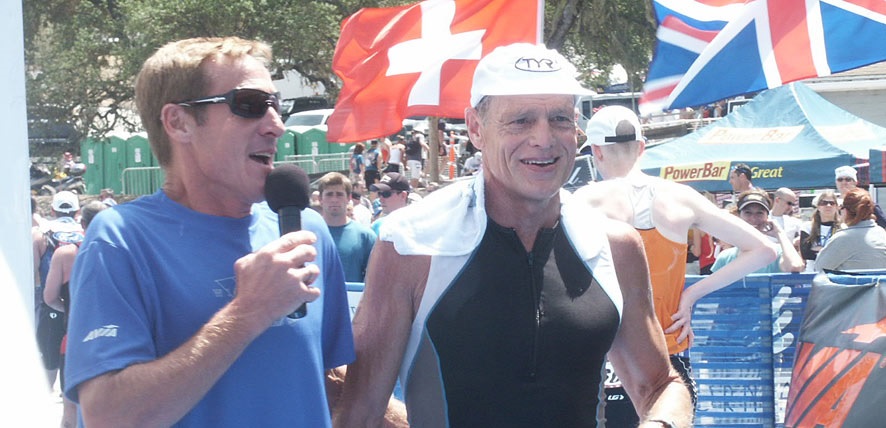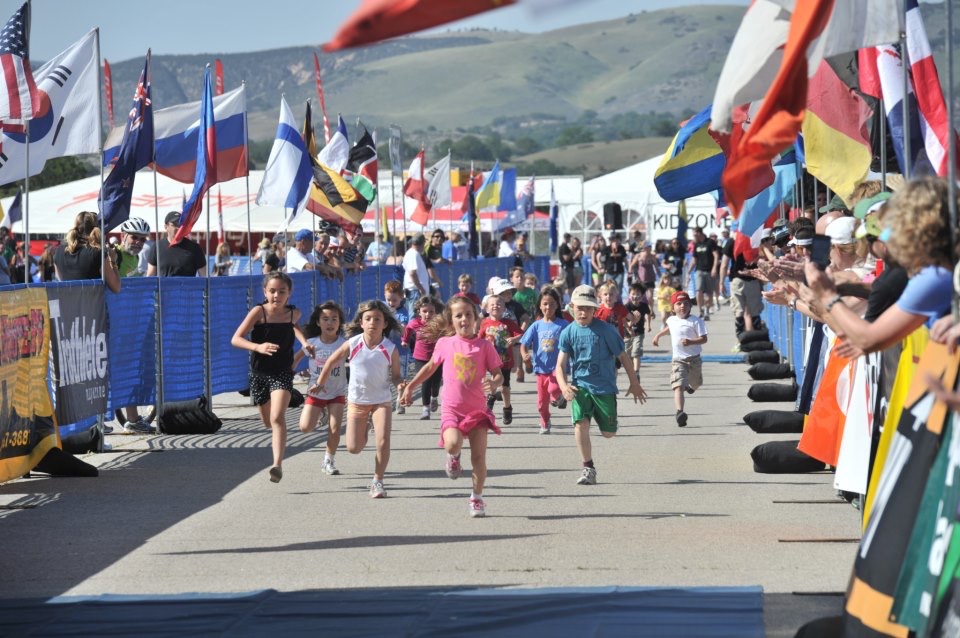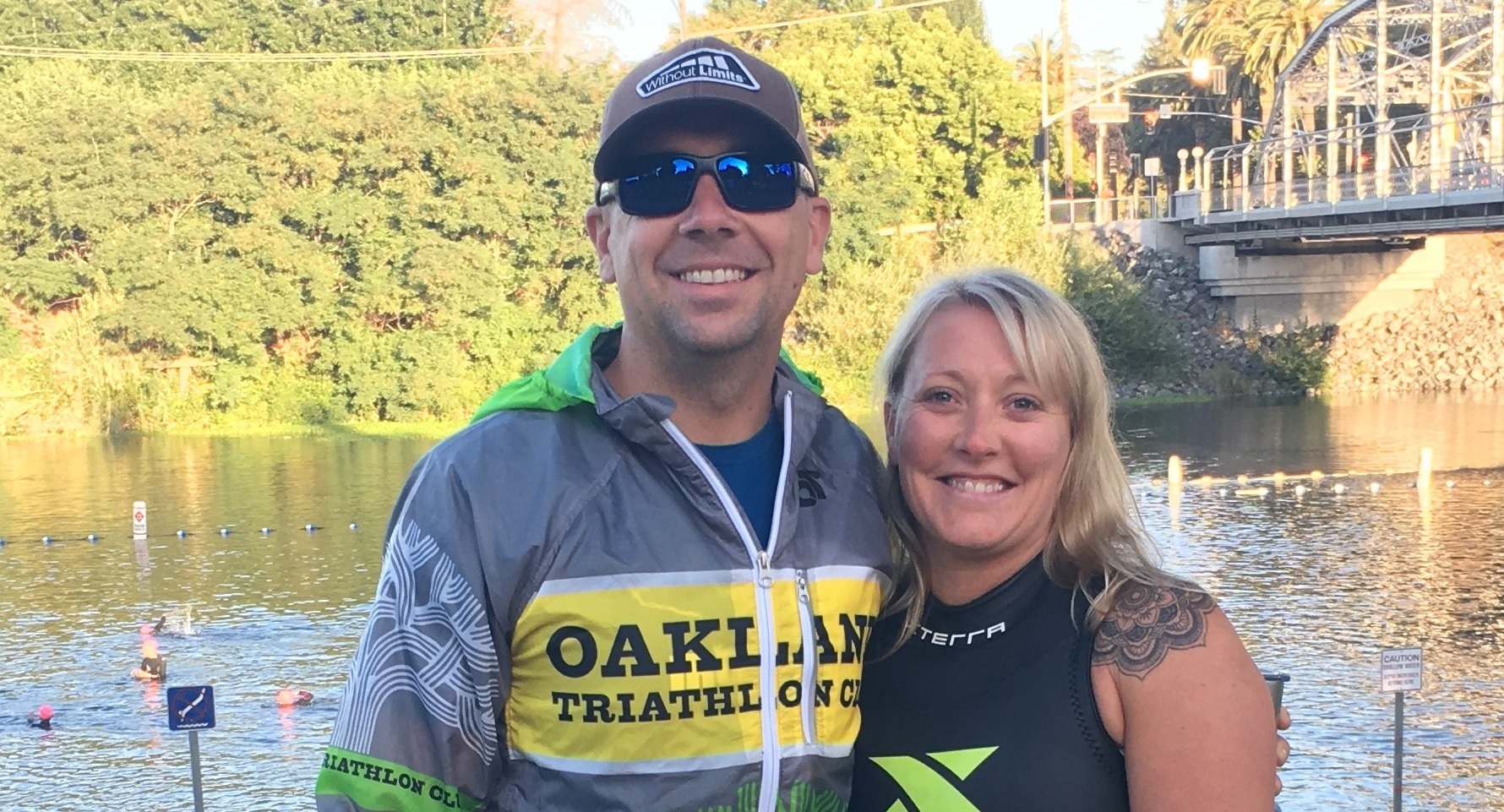The Classic Races: Timeless Wildflower
by: Chris Bagg – Team Wattie Ink
Ed. Note—The Wildflower Triathlons returned last weekend from the dead, and Wattie Ink. pro Heather Jackson returned to the top step of the podium, winning the race for the fourth time. But we’re not gonna talk about the pros too much, today—we’re going to focus on what Wildflower means these days, and why we hope it’s around for another 35 years.
Every sport began as a simple challenge. Basketball? “I bet I can toss more of these wadded-up pieces of paper in that basket than you can.” Soccer? A ball, a field, two athletes simply trying to get past the other to the farther verge. Even my beloved cyclocross began as some bored, cold French cyclists, trying to stay fit in the wintertime without the benefit of Zwift, challenged each other to a race—on road or off—to the next town’s church. Your first competition probably featured a race (“Race ya to that lamp post!”), a feat of strength/wits (“Let’s thumb wrestle!”), or a simple ball toss (“I betcha I can throw this football over those mountains”).
Over time, challenges see their edges get worn away, like stones in a tumbler, as they become organized sport. Cyclocross moved in from the cow pasture, traded farm fences and river crossings for barriers and ditches; basketball needs more space than two office chairs and a garbage bin; foot races need standard distances, or we’re just playing Calvinball. Challenges that existed simply for the sake of the doing turned into competitions, their insane edges filed down to accommodate more athletes. Things became more accessible, surely, but for a price; in our sport, courses have flattened, looped, regressed toward the mean ability of the athletes signing up for them. We have gained so much! Triathlon is a large, vibrant, loud, fit community, but we’ve also lost something. Who can forget that the sport’s founding myth features a bunch of ex-military guys challenging each other to something bonkers? “Let’s do that rough-water swim, then ride around the island! Then, then…I’ll beat you in a marathon!”

The Wildflower Triathlon, however, lives again in that tough-as-nails tradition. Two years ago, hobbled by the California drought, Tri-California cancelled the race one year shy of its 35th anniversary. Participation had struggled the three years prior, as the organizers had shifted the swim two miles from its usual location to find some water. The course went Swim/Run/Bike/Run, and although the course was still gritty, hot, dusty, and hard, athletes had begun turning elsewhere. On the day of the cancellation, though, if you listened hard enough, you could almost hear a gasp run through the triathlon community: Wildflower had been cancelled, and I never got to do it. As the song says, you don’t know what you’ve got til it’s gone, and last spring’s triathlon calendar had a giant Wildfower-sized hole in it.
So when the water came back in the winter of 2017, and Tri-California announced the race would return in 2018, triathletes from all over stormed the barricades. With several weeks to go rumors flew around that the race had sold out, that 5000 athletes would descend upon Lake San Antonio, as they did in the race’s halcyon days in the late 1990s and early aughties. Did you know that you used to be able to pick up a Kona slot at Wildflower? The great Paula Newby-Fraser qualified here countless times. Did you know that Tim DeBoom and Peter Reid conducted a two-pros-only race in 2005, with DeBoom getting to the line first? It’s a course steeped in the best ever: Simon Lessing, Sam McGlone, Natascha Badmann, Terenzo Bozzone. Any quick trawl through the top-ten lists in the past thirty years describes a who’s who in our sport. Wildflower is, simply, the place you go to race against the best.

On race morning, the announcers’ voices float up from transition through the campground, calling racers to their individual dates with difficulty. You step out of your tent or RV and see other racers doing the same, little apostrophes of coffee steam or breath rising above their heads in the crisp air. Wildflower always seems to start cool and finish blazing, and everyone arrives at transition in their sweats. The California Polytech students, who have volunteered here for decades, greet you in the carefree nature of college kids everywhere. After prepping your bike and jogging along Lakeshore Drive, you and thousands of other excited racers walk down the boat ramp towards the race, which tilts upward toward the rising sun like a giant flower. The start area starts to pack up as racers throng the waters edge with their friends and family in tow, a literal buzz in the air (is that a drone?) anticipating the journey ahead. This is triathlon at its heart and soul, a walk back in time when the sport might have been just a bit simpler. Everything about this race warms the heart and brings people together. a bucket list experience that every triathlete should experience at one point in their life.
And it’s more than that, too. These days, everything seems simply to be a stop on the way to something else. Races qualify you for other races, bike rides target virtual leaderboards on Strava, and the pride of a new PR fades quickly in the glare of comparing ourselves to our friends and rivals. Wildflower, though, is an end in itself. What you do on the course, here, is simply that. You can’t really compare the time to any other half-iron race, as this course is just too hard, too different, too crazy. Less resolute race promoters might have moved the race as tastes changed in the sport, but they’ve stuck to their guns. That first hair-raising, fast, technical, mile-long lurch along the lake to start the bike? It’s still there, along with an equally challenging (but much slower) grovel up the first of many steep climbs as you climb the 8.5% grade away from the lake. The bike course is hot, hilly, windy, and conducted on pavement that seems designed to mimic roads in war-torn countries (Fort Hunter-Liggett is a nearby Army Camp). The run course spares you nothing, either, in elevation or surface, as you slog up and down dusty trails through the park, trying to shake the feeling that the race organizers are just having a laugh at your expense.

“It’s hard to describe my love and passion for this race,” says four-time champion Heather Jackson. “To me, Wildflower is what triathlon is all about. It is why I got into the sport and fell in love with it immediately. Wildflower was one of the first races I did as an age grouper in 2008—It was this incredible weekend of hanging out with friends, racing one of the hardest courses out there, cheering on others at all the events, hanging out and enjoying being outside at a festival all Sunday before having to head back to work on Monday. Wildflower is a weekend that embodies what people mean when they describe triathlon as a ‘lifestyle’ sport. Wildflower weekend is about the race, but it’s about so much more and to someone who hasn’t been to this event, they may read this and kind of dismiss this as fluff. All I can say is, find a way to be there next year! Beyond being one of the most fun weekends of the year, the course itself is one of the hardest half-distance races you can ever race. You are constantly up or down on both the bike and run, and throw in about half of the run off-road on trails scrambling up gorgeous hillsides with drop-offs just to your side. After racing this one, honestly everything feels ‘flat” for at least a few weeks after this race. Wildflower was also my first win ever as a professional, and a moment I will remember and cherish my entire life. It is also where Wattie convinced me to quit my job as a 9th grade World History teacher and give being a professional a try. We sat at the picnic table that we have since camped at every year following, and discussed that decision. That was Wildflower 2009, 10 years ago from this year. Honestly, it feels like it was yesterday.”

Once you’re done racing at Wildflower, there’s no hotel to retire to, no air-conditioned vault from which to upload your racing data. There are campgrounds to walk through, Olympic-distance athletes to torture (the short course racers go on Sunday, and have to deal with thousands of reveling long course athletes Saturday night), campfires to surround, s’mores to eat, and beers to quaff.

You can’t get a cellular signal in most of the facility, and therefore have to talk to your fellow racers, an activity that may seem strange at first, but quickly welcome as you realize the bond that connects the two of you, now, as Wildflower finishers. You’ve gone back in time, to when triathlon was just this hard thing that you didn’t know you could complete. You’ve completed it, and maybe you were faster than last time, or maybe not, but it doesn’t really matter. What matters is that you can still feel this race’s edges, 35 years after it started. It’s something real, tangible, hard, and sharp; it’s a race that reaches out and grips you back.

Experience Wildflower: A Weekend Like No Other!
Wildflower is not just a race, it’s a full weekend festival.<br /> From live music spanning bluegrass to rock, to gourmet food trucks, yoga, and wine tastings, this event celebrates local culture while drawing athletes and visitors from around the globe.
Learn MoreAt its heart are iconic endurance events, including four triathlons from long distance to sprint distance, a gravel triathlon, a 20K trail run, 5K and 10K fun runs, and an open water swim. With family-friendly attractions, a kid’s race, and the stunning backdrop of Lake San Antonio, Wildflower is a can’t-miss festival experience! Follow us on social media for the latest updates.
2025 Event Partners
We’re proud to partner with these great brands to bring you an incredible event experience. Whether you’re drenched in sweat, sitting around the campfire or immersed in music, you've worked hard to get there and deserve to have the best time possible.
Your Company can partner with Wildflower Experience to help celebrate one of the hottest California Endurance Sports tradition for over 35 years. Connect with over thousands of athletes from all over world to promote your Brand to this highly engaged and loyal audience.















